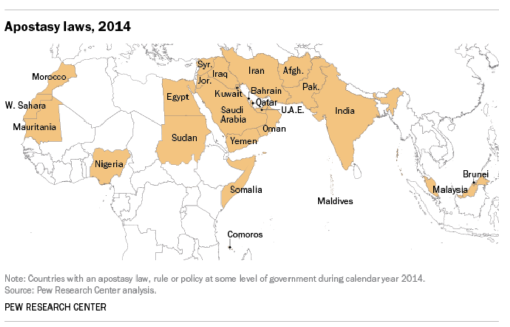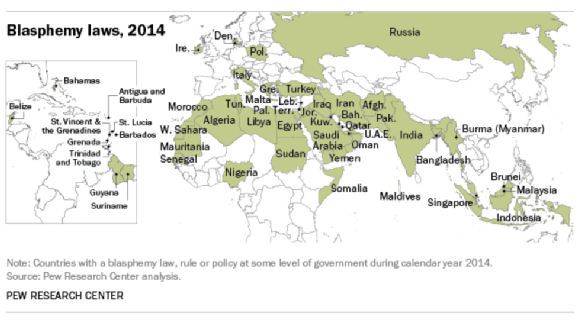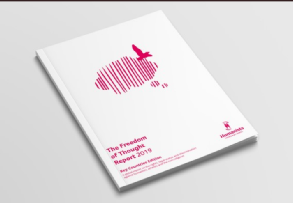|
|
|
CLICK BUTTON TO GO TO |
|
|
|
|
|
|
JewishWikipedia.info
|
PART 1 T O P I C |
|
|
|
|
|
|
|
|
|
|
|
|
|
|
|
|
|
|
WHAT IS BLASPHEMY?
Merriam-Webster Dictionary
DEFINITION OF ‘BLASPHEMY’
1a: the act of insulting or showing contempt or lack of reverence for God
accused of blasphemy
b: the act of claiming the attributes of a deity
for a mere man to suggest that he was … divine could only be viewed … as blasphemy
— John Bright †1889
2: irreverence toward something considered sacred or inviolable
SYNONYMS & ANTONYMS FOR ‘BLASPHEMY’
Synonyms
defilement, desecration, impiety, irreverence, profanation, sacrilege
Antonyms
adoration, glorification, worship
THE ORIGINS OF BLASPHEMY
Blasphemy came into the English language in the 13th century, and for the first several hundred years of its life had but a single meaning, “the act of insulting or showing contempt or lack of reverence for God.” By the early 17th century it began to be applied figuratively to irreverence for things held in great respect that were not necessarily divine in nature, as in the phrase, “a blasphemy against friendship.”
Blasphemy shares a root with blame; both words may be traced to the Greek blasphēmein (“to speak ill of, blaspheme"). Despite the fact that these words are connected, they have diverged sufficiently over the centuries that the meanings are now quite distinct.
LEGAL DEFINITION OF BLASPHEMY
: the crime of insulting or showing contempt or lack of reverence for God or a religion and its doctrines and writings and especially God as perceived by Christianity and Christian doctrines and writings NOTE: In many states, blasphemy statutes have been repealed as contrary to the First Amendment.
A blasphemy law is a law prohibiting blasphemy, where blasphemy is the act of insulting or showing contempt or lack of reverence to a deity, or sacred things, or toward something considered sacred or inviolable.[1][2][3][4] According to Pew Research Center, about a quarter of the world's countries and territories (26%) had anti-blasphemy laws or policies as of 2014.[5]
In some states, blasphemy laws are used to protect the religious beliefs of a majority, while in other countries, they serve to offer protection of the religious beliefs of minorities.[6][7][8]
In addition to prohibitions against blasphemy or blasphemous libel, blasphemy laws include all laws which give redress to those insulted on account of their religion. These blasphemy laws may forbid: the vilification of religion and religious groups, defamation of religion and its practitioners, denigration of religion and its followers, offending religious feelings, or the contempt of religion. In some jurisdictions, blasphemy laws include hate speech laws that extend beyond prohibiting the imminent incitement of hatred and violence, including many European countries that are included in Freedom of speech by country but not yet in this article. Some blasphemy laws, such as those formerly existing in Denmark, do not criminalize "speech that expresses critique," but rather, "sanctions speech that insults."[9]
Article 20 of the International Covenant on Civil and Political Rights obliges countries to adopt legislative measures against "any advocacy of national racial or religious hatred that constitutes incitement to discrimination, hostility or violence."[10] However, they also note that such protections must be carefully circumscribed, and do not support prohibition of blasphemy per se
For Example in Mulim-majority countries
In a number of countries where Islam is the state religion, Islamic sharia law is the principal legislation, or affects the laws of the country. Blasphemy in Islam is impious utterance or action concerning God, Muhammad or anything considered sacred in Islam. The Islamic holy book, the Qur'an, admonishes blasphemy, but does not specify the punishment. The hadiths, which are another source of sharia, suggest various punishments for blasphemy.
Afghanistan
Main article: Blasphemy law in Afghanistan
An Islamic state, Afghanistan prohibits blasphemy as an offense under Sharia. Blasphemy can be punished by retaliatory penalties up to and including execution by hanging
Indonesia
Main article: Blasphemy law in Indonesia
Article 156(a) of Indonesia's Criminal Code forbids anyone from deliberately, in public, expressing feelings of hostility, hatred, or contempt against religions with the purpose of preventing others from adhering to any religion, and forbids anyone from disgracing a religion. The penalty for violating Article 156(a) is a maximum of five years of imprisonment.
Iran
Main article: Blasphemy law in Iran
An Islamic theocracy, Iran derives its law against blasphemy from Sharia. The law against blasphemy complements laws against criticizing the Islamic government, insulting Islam, and publishing materials that deviate from Islamic standards
Saudi Arabia
Main article: Blasphemy law in Saudi Arabia
Islam is Saudi Arabia's state religion. The country's monarchy follows Sunni Islam. The country's laws are an amalgam of rules from Sharia, royal edicts, and fatawa from the Council of Senior Religious Scholars; they prescribe penalties up to the death penalty for blasphemy.
HUMANIST CAMPAIGN CHALLENGES BLASPHEMY LAWS
BBC News John McManus, BBC Social Affairs Reporter, 30 January 2015
Blasphemy laws are being challenged in a new global campaign launched by a coalition of humanist organisations. The International Humanist and Ethical Union (IHEU) says that, in the wake of the Charlie Hebdo attacks in France, the time is right for countries to abolish laws that protect religious sensibilities. But blasphemy laws nevertheless remain popular in many parts of the world.
The attacks on the staff of the Charlie Hebdo satirical magazine led to a massive response in defence of free speech - in France, but also across the world.
Equally intensely, some parts of the world saw protests against both the original cartoons, and the subsequent publication of another image of the Prophet Muhammad.
There is a particular prohibition against showing the image of Muhammad in some strands of Islam, but the crime of blasphemy can be found in many religions and countries.
To its supporters, it's a crucial way of protecting religious feelings and minorities; for others, it impedes free speech and can be used to suppress political dissent.
MINORITY PERSECUTION
Sonja Eggerickx is the president of IHEU which works to promote an evidence-led ethical society.
She says the campaign is intended to support local people on the ground already working against blasphemy laws.
"The idea that 'insult' to religion is a crime is why humanists like Asif Mohiuddin are jailed in Bangladesh, is why secularists like Raif Badawi are being lashed in Saudi Arabia, is why atheists and religious minorities are persecuted in places like Afghanistan, Egypt, Pakistan, Iran, Sudan, and the list goes on," she says.
Raif Badawi was sentenced to 1,000 lashes in May 2014 by a Saudi court after being found guilty of insulting Islamic religious figures on his blog.
Philip Blackwood, centre, a New Zealander general manager of V Gastro Bar, is escorted by Myanmar police officers to face trial at a township court 26 December 2014, in Yangon, Myanmar.
Philip Blackwood was charged in Burma in relation to a picture showing Buddha wearing headphones
Pakistan also has severe laws protecting religious feelings.
Asia Bibi, a 50-year-old mother-of-five, has been on death row since 2010 after being convicted of insulting Islam during an argument over a glass of water.
John Pontifex from the charity Aid to the Church in Need, which campaigns for Christian minorities, says many cases never reach court.
"They [blasphemy laws] give the fig leaf of respectability to acts of violence against Christians and others accused of crimes they very often have not committed," he said.
But do blasphemy laws help society in any way?
The Pew Research Centre has found that the laws are most common in the Middle East and North Africa.
And it is from this region that the most vocal advocates of the laws can be found.
The Organisation of Islamic Co-operation, which represents 56 Islamic states, has repeatedly tried to get United Nations support for an international measure to outlaw insults to religion.
It says that such a resolution would protect groups from discrimination.
Last year, the organisation's secretary general, Iyan Ameen Madani, said that freedom of expression was clashing with Islamic teachings.
He criticised countries who refused to limit free speech, which he said was harming religious minorities.
"Muslim countries enacting laws to ensure respect for the sanctity and reputation of religious values, scriptures and personalities for promotion of peace in society, are criticised on account of limiting this freedom through blasphemy laws," he said.
Those laws are not just found in the Middle East.
BLASPHEMY IN EUROPE
In Denmark, paragraph 140 of the penal code is about blasphemy. The paragraph has not been used since 1938 when a Nazi group was convicted for anti-Semitic propaganda.
In Myanmar, also known as Burma, in December, three men were charged by the authorities with insulting religion after they allegedly distributed a picture depicting Buddha wearing headphones.
Some European countries also criminalise anti-religious sentiments in some form.
In 2012 there were 99 convictions for "public blasphemy" in Malta, with punishments ranging from fines to imprisonment.
And in 2014, Russian MPs voted for a new law against offending religious feelings.
It followed a political protest by members of the group Pussy Riot in Moscow's Orthodox cathedral.
Members of the Russian radical feminist group Pussy Riot try to perform at the Christ the Saviour Cathedral in Moscow, 21 February 2012
Pussy Riot were charged with blasphemy for performing a protest song in Moscow's main cathedral
The charge against the three included "insult to religious feelings".
In Ireland, campaigners are furious that the government there has reneged on a promise to hold a referendum on its blasphemy laws, which were themselves only introduced in 2009.
And last year, a Greek man who satirised a dead Orthodox monk on Facebook was sentenced to 10 months in prison.
Those who want to extend religious insult laws are also making plans.
The UN Human Rights Council says it is likely that the issue of insulting religions will be raised at the council's upcoming sessions in March, at the request of Saudi Arabia.
'MINORITY VOICES'
The IHEU campaign, though, is not about encouraging discrimination, says Bob Churchill, its director of communications.
"Our campaign does not target laws against incitement to hatred, which are legitimate," he said.
Mr Churchill also rejects the charge of cultural imperialism.
"The reality is that minority voices for change and reform are there. The problem is they often cannot be heard."
APOSTASY
Wikipedia (go to site for full article)
Apostasy in Islam (Arabic: ردة riddah or ارتداد irtidād) is commonly defined as the conscious abandonment of Islam by a Muslim in word or through deed. It includes the act of converting to another religion or non-acceptance of faith to be irreligious, by a person who was born in a Muslim family or who had previously accepted Islam. The definition of apostasy from Islam, and whether and how it should be punished, are matters of controversy and Islamic scholars differ in their opinions on these questions.
As of 2014, laws in various Muslim-majority countries prescribed for the apostate (Arabic: مرتد murtadd) sentences ranging from execution to a prison term to no punishment. Sharia courts in some countries use civil code to void the Muslim apostate's marriage and to deny child-custody rights as well as inheritance rights. From 1985 to 2006, three governments executed four individuals for apostasy from Islam: "one in Sudan in 1985; two in Iran, in 1989 and 1998; and one in Saudi Arabia in 1992." Twenty-three Muslim-majority countries, as of 2013, additionally covered apostasy from Islam through their criminal laws. The Tunisian Constitution of 2014 stipulates protection from attacks based on accusations of apostasy. In a Pew Research Center poll, public support for capital punishment for apostasy among Muslims ranged from 78% in Afghanistan to less than 1% in Kazakhstan.
WHICH COUNTRIES
STILL OUTLAW APOSTASY AND BLASPHEMY?
Pew Research Center Angelina E. Theodorou, July 29 2016

Apostasy and blasphemy may seem to many like artifacts of history. But in dozens of countries around the world, laws against apostasy and blasphemy remain on the books and often are enforced.
Last December, for instance, authorities in Sudan charged 25 men for apostasy – the act of abandoning one’s faith — including by converting to another religion. The men face the death penalty for following a different interpretation of Islam than the one sanctioned by the government. And, in Pakistan, police are currently pursuing a Christian accused of sending an allegedly blasphemous poem to a friend. Blasphemy – defined as speech or actions considered to be contemptuous of God or the divine – is a capital crime in Pakistan.

A new Pew Research Center analysis finds that, as of 2014, about a quarter of the world’s countries and territories (26%) had anti-blasphemy laws or policies, and that more than one-in-ten (13%) nations had laws or policies penalizing apostasy. The legal punishments for such transgressions vary from fines to death.
We counted and categorized these laws in 2014 as part of our research for a major report on restrictions on religion around the world. This report, which examines both government restrictions on religion and social hostilities involving religion, relied on 17 widely cited, publicly available sources from groups such as the U.S. State Department, the United Nations, Human Rights Watch, Amnesty International and the International Crisis Group.
We found that laws restricting apostasy and blasphemy are most common in the Middle East and North Africa, where 18 of the region’s 20 countries (90%) criminalize blasphemy and 14 (70%) criminalize apostasy. While apostasy laws exist in only two other regions of the world – Asia-Pacific and sub-Saharan Africa – blasphemy laws can be found in all regions, including Europe (in 16% of countries) and the Americas (29%).
Some blasphemy laws have been on the books for decades and have endured in spite of dramatic political and social changes. In Pakistan, for instance, blasphemy statutes have their origins in the country’s colonial past, when British rulers first introduced penalties for insulting any religious beliefs. These laws remained in effect after Pakistan’s independence in 1947 and have since increased in severity.
Pakistan is one of 12 of the 50 countries in the Asia-Pacific region (24%) that had blasphemy laws in 2014. And, during that year, blasphemy laws were enforced in several of those 12 nations. For instance, in Burma (Myanmar), a New Zealander and two Burmese men were convicted of blasphemy after using an advertisement depicting Buddha with headphones to promote a bar. The men were sentenced to two and a half years in prison.
Blasphemy laws are least common in sub-Saharan Africa (four of 48 countries), according to 2014 data. In Europe as well, blasphemy laws are not very common, being found in just seven out of 45 nations (16%).
In the Americas, 10 out of 35 countries (29%) had blasphemy laws, including the Bahamas, where the publication or sale of blasphemous material can be punished with up to two years imprisonment. The U.S. does not have any federal blasphemy laws, but as of 2014, several U.S. states – including Massachusetts and Michigan – still had anti-blasphemy laws on the books. However, the speech and religion clauses of the First Amendment to the U.S. Constitution would almost certainly prompt a court to ban the enforcement of any such law.
Apostasy laws are less common worldwide – they are found in 25 countries, in only three regions of the world. By far the most countries with anti-apostasy measures were in the Middle East-North Africa region (14 out of 20).
Seven of the 50 countries (14%) in the Asia-Pacific region also had apostasy laws. For instance, in the Maldives, all citizens are required to be Muslim, and those who convert to another faith may lose their citizenship. In sub-Saharan Africa, just four of the 48 countries (8%) have laws prohibiting apostasy. There were no laws against apostasy in any countries in Europe or the Americas in 2014.
BLASPHEMY LAWS EXIST IN 69 COUNTRIES
National Secular Society, Wed, 13 Nov 2019
 Free thought report
Free thought report
Sixty-nine countries have blasphemy laws and penalties have hardened in parts of the world in recent years, according to a report on the status and rights of the non-religious.
The 2019 edition of the Freedom of Thought Report, from Humanists International, has found that blasphemy is punishable by death in six countries.
Eighteen countries outlaw 'apostasy' – leaving a religious tradition – and in 12 of them it is punishable by death. The report says people can effectively be put to death for expressing atheism in 13 countries.
The figures come despite the fact that blasphemy laws have been repealed in eight countries in the last five years. Six of these countries are in Europe. Legislation is also pending in Ireland, following a referendum vote to repeal its blasphemy law.
The worst offenders
The report identifies Saudi Arabia and Pakistan as "perennial" prosecutors for blasphemy and says freedom of thought is particularly penalised by Islamic penal codes and sharia-influenced laws.
It notes that accused atheists suffer from ongoing imprisonment and extrajudicial violence in Pakistan – despite the high-profile release of Asia Bibi, who spent eight years on death row for blasphemy. It also notes that criticism of Pakistan's blasphemy law is often denounced as itself an act of blasphemy, meaning critics are at risk of condemnation and even assassination.
The report also identifies several countries where freedom of thought on religion is deteriorating, most significantly:
Brunei, where a new penal code this year renders blasphemy and apostasy punishable by death
Mauritania, which introduced a mandatory death sentence for blasphemy and apostasy last year
Indonesia, where high-profile blasphemy prosecutions are cited as a cause for concern
Iran, where the government has cracked down on demonstrators protesting against forced hijab laws
India, where the report cites concern about prosecutions and intercommunal violence linked to Hindutva beliefs.
State enforcement of religious orthodoxy
The report also highlights the extent to which states enforce a particular religious orthodoxy. It ranks countries according to their record in four categories: constitution and the government; education and children's rights; society and community; and expression and advocacy of humanist values.
Those with the gravest violations in each category tend to be in the Middle East and Africa – along with China, where the government is currently clamping down severely on religious expression.
Responses to the report
National Secular Society spokesperson Chris Sloggett said: "Blasphemy and apostasy laws are always an affront to the fundamental rights to freedom of expression and belief, and are never justifiable.
"This report shows that these laws and state enforcement of religious doctrine plague societies and undermine individual rights around much of the world. Politicians must face global pressure to repeal these unjust laws.
"Politicians in the UK should take a keen interest in this repression in their dealings with other countries. And they should lead by example by promoting free speech on religion as a positive value and the separation of religion and politics at home."
Humanists International president Andrew Copson said repealing blasphemy and apostasy laws "must be a priority". He added that doing so would "begin to de-legitimise the religious extremism that threatens so many societies across so much of the planet".
Notes
The countries that have repealed blasphemy laws in the past five years are Norway, Iceland, Malta, the Alsace-Moselle region of France, Denmark, Canada, New Zealand and Greece.
This week it was reported that Greece was considering re-introducing its law – with a punishment of up to two years in prison. But according to further reports the Greek government quickly dropped its plan.
The report notes a general trend of religious belief gradually declining around the world. It calls on commentators to recognise that where the number of non-religious people appears to be very low, that may reflect self-censorship on the part of the non-religious.
THE
INCREDIBLE
STORY OF THE JEWISH PEOPLE

|
|
|
BLASPHEMY and APOSTASY in ISLAM
